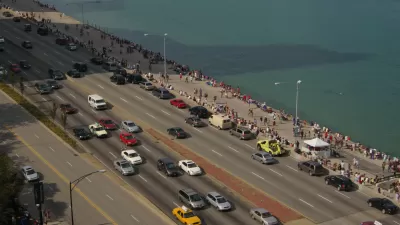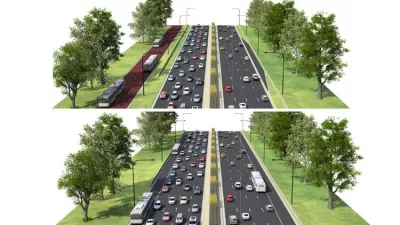This week, the Illinois DOT kicked off a set of public meetings to "redefine" Chicago's Lake Shore Drive. At the first meeting, a decidedly pro-car and anti-bicyclist sentiment crept into the comments.
As we noted earlier this week, a coalition of Chicago advocacy groups, including the Active Transportation Alliance, the Metropolitan Planning Council, and the Congress for the New Urbanism released a set of recommendations last week to guide the public process. The platform recommends increasing public access to the waterfront, providing more access for cars to the street grid, and slowing traffic speeds from 40 mph to 35 mph. Advocates say that without public support for these ideas in whole or in part, the roadway will likely continue on "a slow shift towards a superhighway."
But at the debut meeting, many of the Chicagoans who attended (at least according to the Chicago Tribune) were mixed on their support of these ideas. “Bicyclists think they have priority in sidewalks and other places, not the bike path...(c)yclists do not yield," complained one post-it noter. Another person quoted in the article seemed to think doing anything different was a bad idea. "Just resurface it," they suggested. "Save the taxpayers money." Still, there seemed to be widespread support for light rail along Lake Shore Drive.
Supporters of the coalition's platform will have more chances to get their voice heard - initial meetings continue this week.
FULL STORY: Bicyclists take a beating at Lake Shore Drive revamp meeting

Maui's Vacation Rental Debate Turns Ugly
Verbal attacks, misinformation campaigns and fistfights plague a high-stakes debate to convert thousands of vacation rentals into long-term housing.

Planetizen Federal Action Tracker
A weekly monitor of how Trump’s orders and actions are impacting planners and planning in America.

San Francisco Suspends Traffic Calming Amidst Record Deaths
Citing “a challenging fiscal landscape,” the city will cease the program on the heels of 42 traffic deaths, including 24 pedestrians.

Defunct Pittsburgh Power Plant to Become Residential Tower
A decommissioned steam heat plant will be redeveloped into almost 100 affordable housing units.

Trump Prompts Restructuring of Transportation Research Board in “Unprecedented Overreach”
The TRB has eliminated more than half of its committees including those focused on climate, equity, and cities.

Amtrak Rolls Out New Orleans to Alabama “Mardi Gras” Train
The new service will operate morning and evening departures between Mobile and New Orleans.
Urban Design for Planners 1: Software Tools
This six-course series explores essential urban design concepts using open source software and equips planners with the tools they need to participate fully in the urban design process.
Planning for Universal Design
Learn the tools for implementing Universal Design in planning regulations.
Heyer Gruel & Associates PA
JM Goldson LLC
Custer County Colorado
City of Camden Redevelopment Agency
City of Astoria
Transportation Research & Education Center (TREC) at Portland State University
Jefferson Parish Government
Camden Redevelopment Agency
City of Claremont




























